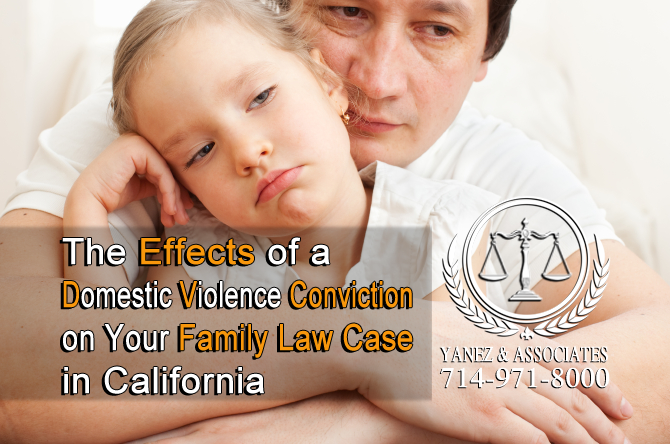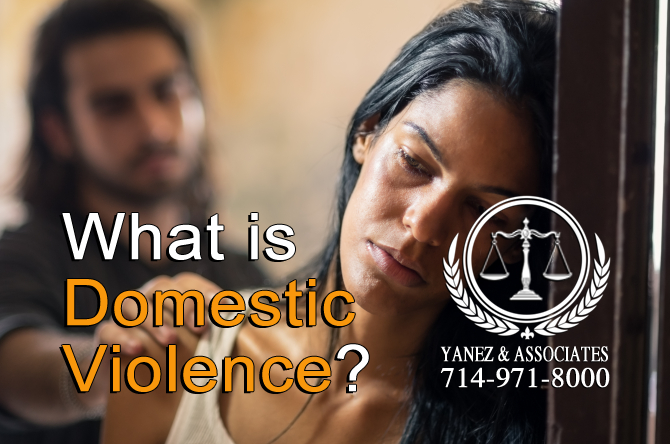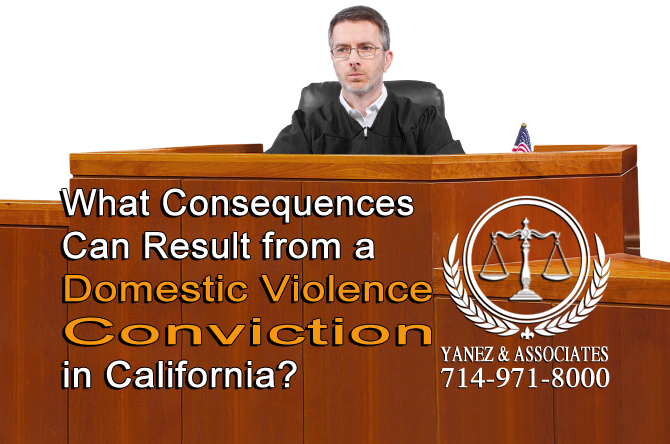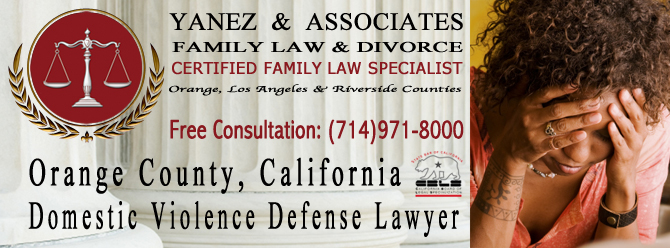Domestic Violence FAQ: Attorney Yanez, is it a good idea to defend myself if charged with domestic violence in Orange County California?
Should I defend myself if charged with domestic violence in Orange County, California?
"Defend myself if charged with domestic violence" There is no simple answer to this question. However, the fact that you are reading this blog post suggests that if defending yourself against the domestic violence charges that you face is an option, you would like to do so.
Depending on your current legal and family situation, facing domestic violence charges can have negative consequences on your life outside of the criminal punishments that you could face, like fines or jail time.
Because of the harsh consequences that you could potentially face, it is always advised that you discuss your case with a qualified family lawyer, as well as a criminal defense attorney. Some law firms in California, like Yanez & Associates, can offer you both so you may simplify your legal assistance. Attempting to defend yourself against domestic violence claims is never advised.
It is important that you are honest with your attorney so that he or she can help provide you with the best possible defense. However, in part due to the harsh consequences of a domestic violence conviction, it is not unheard of for a false domestic violence claim to result in unwarranted domestic violence charges, convictions, and punishments. Defenses to exist, and if you are found not guilty of the charges against you, the potential exists for you to end up better off than the accusing party.
Remember that the purpose of domestic violence laws is to keep all parties safe.
What is Domestic Violence?
In California, domestic violence includes several forms of abuse between people with a specific relationship. “Domestic” refers to the relationship, and “violence” refers to the abuse. There are various types of violence and abuse, and the law categorizes them based on the relationship between the abuser and the victim.
Violence or abuse that is considered “domestic violence” in California means that the abuser and the victim have an “intimate relationship”. This can include many types of first degree relationships, like the following:
• The abuser and the victim may be married, or may have been married in the past and are now legally separated or divorced;
• The abuser and the victim may be in a registered domestic partnership, or were formerly in a registered domestic partnership;
• The abuser and the victim may be dating or may have formerly been in a romantic relationship;
• The abuser and the victim may have lived together;
• The abuser and the victim may share a child, even if they are not in a relationship;
• The abuser and the victim may be in the same family, including a parent and child, siblings, a grandparent and grandchild, or otherwise closely related by either blood or marriage; or
• There are several other close relationships that may constitute domestic violence in California.
Violence or abuse can include various actions under California law, including physical abuse, threats of abuse, sexual assault, verbal abuse, destruction of another person’s property, harassment, stalking, and more. If you have questions about what may or may not constitute abuse in California, ask your California attorney.
What Consequences Can Result from a Domestic Violence Conviction in California?
In California, you may face civil and/or criminal consequences for a domestic violence charge or conviction. You may also have to deal with the requirements and restrictions of a domestic violence restraining order against you.
Effects of a Domestic Violence Restraining Order on the Restrained Person
As the person accused of domestic violence, in the case of a domestic violence restraining order, you will be referred to as “the restrained person”.
Domestic violence restraining orders can be issued at several times in various ways. An emergency protective order may be issued immediately, if the victim, or the protected person, is in danger and has a law enforcement officer call a judge for a temporary emergency order. This will go into effect within 24 hours of the call to the judge, and will last for seven days. A temporary restraining order may be issued when the protected person approaches a judge and requests one. It will last for between 20 and 25 days, by which time a court hearing may be held where you can defend yourself. A permanent or long term domestic violence restraining order will not be issued without offering you the opportunity to defend yourself in court - if you wish to do so.
Restraining orders may place restrictions on what you, as the restrained person, may do. If the judge determines that any of the following are necessary, they may be added to the terms of the protective order.
• A restraining order can order you to refrain from contacting or going near the restrained person. This may include your spouse, your children, your child’s other parent, other relatives, or people with whom you live.
• A restraining order can require you to stay away from your home, your place of work, or your school, or the home, workplace or school of your spouse, former spouse, children, or other people.
• A restraining order can require you to move out of your home.
• A restraining order can disallow you from owning a gun.
• A restraining order may establish new child custody and visitation orders that you are required to abide by.
• A restraining order may require you to pay child support.
• A restraining order may require you to pay spousal or partner support.
• A restraining order may require you to stay away from your pets.
• A restraining order may require you to fulfill certain financial obligations, like paying bills for your family you cannot spend time with or contact, paying for a home you cannot live in, etc.
• A restraining order may require you to maintain insurance policies.
• A restraining order may disallow you from making large purchases, even with your own funds.
• A restraining order may place other restrictions on your life, actions, and finances.
A violation of a restraining order in California may result in jail time, fines, or a combination of both. Violating the restraining order may also have negative effects on your family situation, including child custody and family support requirements
The Effects of a Domestic Violence Conviction on Your Family Law Case in California

How will the out come of a DV case or conviction affect the outcome of my family law case in Orange County?
A violation of a domestic violence restraining order or a conviction in your domestic violence case can affect the outcome of any pending family law cases that you may have in the California courts. It can also be the source of a new family law case, and may have a negative effect on the outcome for you.
Child Custody
For example, consider a child custody and visitation situation. Child custody orders are always made according to the best interests of the child. This means that if there are domestic violence charges pending against you, regardless of your guilt, it may not be in the best interests of your children to spend unsupervised time with you. Think of it from another perspective - even if another person was innocent, would you want your children to spend time with a person who was facing domestic violence charges?
Regardless of your guilt or how much you want to spend time with your children, follow the terms of the custody and visitation order. It will show the court that you not only value your children’s safety and wellbeing, but that you are willing to put your child’s needs ahead of your own. Disobeying a child custody order will likely result in you losing custody of or visitation with your children even if you are found not guilty of the charges against you.
Spousal Support
Spousal support is issued in California according to the financial needs of both parties, with the intention of allowing both parties to maintain the standard of living that was established during the marriage or registered domestic partnership. However, a domestic violence conviction can also play a role in the determination of spousal support.
If there is documented evidence that domestic violence took place during a marriage (or if you are convicted of domestic violence), the judge may order you to pay spousal support in a higher amount to pay for the pain and suffering that you caused. Adversely, if you are convicted of domestic violence but would be the spouse or partner to receive support following a divorce or legal separation, the judge may order a lower amount or no spousal support at all.
Orange County, California Domestic Violence Defense Lawyer
While you do not have to defend yourself against domestic violence charges in California, you should be prepared to face the above mentioned consequences. Domestic violence is a serious charge with serious consequences. You may also face consequences of a criminal court, which this blog post did not cover.
If you have questions about your potential defense, you should discuss your case, the potential consequences of a conviction and any other questions you may have with a qualified California attorney. Contact the lawyers at Yanez & Associates for a free initial consultation. We have legal professionals who have experience in both family law and criminal law in California.















